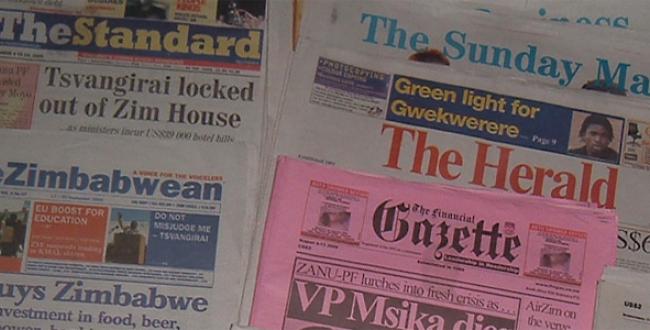


 NEARLY all the country’s newspapers are sitting on costly lawsuits, some of which have claims of above US$1 million thereby putting on a dent on their going concern status.
NEARLY all the country’s newspapers are sitting on costly lawsuits, some of which have claims of above US$1 million thereby putting on a dent on their going concern status.
Zimbabwean politicians and other influential citizens are proving to be highly litigious, but some of the exorbitant claims in alleged damages are raising concerns that the process is being abused as an intimidatory tactic to gag the media.Even though the media has the responsibility to report factually and fairly, there is increasingly a trend where politicians and others have made outrageous monetary claims, putting editors and journalists under pressure of being fired for exposing their publications to heavy websites.
This week media experts said it was now widely accepted under media freedom discourse that press freedom should be balanced with respect for the citizens’ rights to privacy, dignity and other related rights.
This means that when any corporate or private citizen feels aggrieved by the reportage of any media house, it would be entirely within their rights to institute legal action against the offending publication.
However, exorbitant and frequent litigation or judicial claims against newspapers equals to harassment of the media, and remains a glaring threat to press freedom in Zimbabwe.
Media experts argue that awards in defamation cases must ordinarily be symbolic, not excessive in terms of monetary value.
An illustration of this is the case that was before the courts in the United Kingdom in the 1980s where Zimbabwean international football player — Bruce Grobbelaar was awarded only £1 damages, even though he had succeeded in his claim relating to allegations of match-fixing made in The Sun newspaper.
On Tuesday, media lawyer Chris Mhike said if this sort of award would become a pattern in Zimbabwe’s courts of law, claimants would be discouraged from instituting actions that threaten the existence of newspapers.
“It must be borne in mind that the amounts claimed in any action should not be excessive, and certainly must not be so huge as to decimate the media house being sued, in the event of the sum claimed being awarded. When one looks at the sizes of the local media houses, at least in terms of monetary capitalisation, it goes without saying that a US$2 million claim would be a grotesque threat, generally to media freedom, and particularly to the continued existence of the targeted media house,” said Mhike.
“Judicial officers must realise that the closure of a newspaper through the award of an exorbitant determination against the media house is ultimately not in the public interest. The real punishment for an offending newspaper lies in the decline in confidence by readers, in a newspaper that repeatedly loses defamation cases against readers,” he said.
A section of Zimbabweans who believe in the media’s self regulation, instead of having the courts or executive interfering in its operations have now resorted to going to the Voluntary Media Council of Zimbabwe (VMCZ) for redress.
The VMCZ has an operational Media Complaints Committee chaired by retired chief justice, George Smith, that handles complaints against the media through the enforcement of a code of conduct that guides journalists in their day to day operations.
“The VMCZ has been successful in adjudicating cases since formation in 2007. The Media Complaints Committee of the VMCZ has adjudicated and resolved close to 100 cases involving ordinary members of the public. In all these cases there have been no costs incurred by the complainants in the matter,” VMCZ executive director, Loughty Dube, told the Financial Gazette on Tuesday.
“The advantage of using the VMCZ complaints mechanism is that it does not involve any costs and the handling of cases is timeous. The media self- regulation process also removes any interference from politicians and the government.”
Dube said the media, if found to have breached the code of conduct, can offer an apology, retraction or clarification to any story.
In his handbook, A Guide to Media Law in Zimbabwe, University of Zimbabwe law lecturer professor Geoff Feltoe said the defamation law operational in Zimbabwe imposes strict liability on the media. Feltoe said current laws expose the Press to defamation.
“It is strongly arguable that the present law weights the balance too far in favour of protection of reputation and is too restrictive upon the press when reporting in the public interest,” he said.
newsdesk@fingaz.co.zw